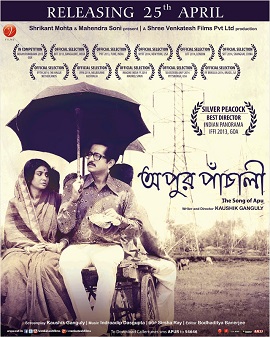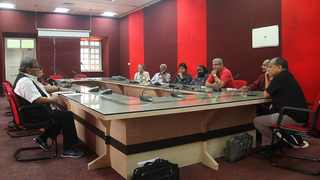
Bombaiyer Bombete is a 2003 Indian Bengali thriller film directed by Sandip Ray and based on the story of the same name by his father Satyajit Ray. It was the third big screen adaptation of the fictional detective character Feluda after 25 years of the second Feluda movie Joi Baba Felunath (1979), which was directed by Satyajit Ray. It was the first big screen adaptation of the Feluda new film series though Sabyasachi played Feluda in all the ten TV films of Feluda TV film series (1996-2000) directed by Sandip Ray. The movie was a sequel to the Doctor Munshir Diary, the last television film of Feluda TV film series (1996-2000), which was a sequel series to the Satyajit Ray's Feluda film series (1974-1979).

Subir Banerjee is an Indian actor who played Apu in Satyajit Ray's Bengali film Pather Panchali, the first installment of The Apu Trilogy.

Chalo Let's Go is a 2008 Indian drama movie in Bengali starring Ritwick Chakraborty, Rudranil Ghosh, Saswata Chatterjee and Parambrata Chatterjee, written and directed by Anjan Dutt.

Arekti Premer Golpo is a 2010 Indian drama film directed by Bengali filmmaker Kaushik Ganguly, written by Kaushik Ganguly. It stars Rituparno Ghosh and Indraneil Sengupta, with Ghosh playing a transgender filmmaker. It is the first film on queerness to be shot after the Delhi High Court struck down portions of Section 377 of the Indian Penal Code in July 2009 as unconstitutional with respect to gay sex. The film premiered at the 60th Berlin Film Festival in 2010.
Kaushik Ganguly is an Indian film director, screenwriter and actor in Bengali cinema. Multiple National Film Awards winner Actor-Director, Kaushik Ganguly is known for making films that explore various aspects sexuality, like Ushnatar Janye (2003), which deals with a lesbian relationship, and Arekti Premer Golpo (2010), which examines transgender identity & Nagarkirtan (2017), an LGBTQ Movie. In 2019, Film Companion ranked Ridhi Sen's performance in Nagarkirtan which was directed by Ganguly, among 100 Greatest Performances of the decade.

Churni Ganguly is an Indian actress and director who mainly works in Bengali movies and television productions. She received the Bengal Film Journalists' Association Awards in 2005 in the best actress category for the movie Waarish, in which she played a single-mother's role. She won two National Film Awards for her directorial ventures Nirbashito and Tarikh.

Waarish (transl. Heir) is a 2004 Bengali film directed by Kaushik Ganguly. It stars Debashree Roy, Mamata Shankar, Sabyasachi Chakraborty, Churni Ganguly and Aniket in the leading roles. The film marked Kaushik Ganguly's directorial debut and it was also Churni Ganguly first film on the big screen.

Parno Mitra is an Indian actress who appears in Bengali films. Mitra started her career on television. Her acting assignment was Ravi Ojha's Bengali TV series Khela (2007). She was catapulted to stardom after she enacted Ranjana in Anjan Dutta's National Award winning Bengali film Ranjana Ami Ar Ashbona (2011).

Paran Bandopadhyay is an Indian Bengali film, television and stage actor based in Kolkata. He has worked with Bengali film director Sandip Ray, the son of filmmaker and author Satyajit Ray.

Shabdo (Sound) is a 2012 Indian Bengali film directed by Kaushik Ganguly. The film revolves around the life of Tarak, a Foley artist from a Bengali film. Tarak's job is to create ambient sounds for films, but, he gradually gets trapped in his own world, a world full of sound. It won the 60th National Film Awards for Best Feature Film in Bengali and the Best Audiography. It went on to KFF 2011, IFFI 2012, Goa, Dubai Film Festival, Singapore Film festival 2012.

Brake Fail is a 2009 Bengali film. The film was directed by Kaushik Ganguly. The film was produced by Mumbai Mantra and the music of the film was composed by Neel Dutt.

Apur Panchali is a 2013 Bengali film directed by Kaushik Ganguly and produced by Shree Venkatesh Films. It is based on the life of Subir Banerjee, the actor who played Apu in Pather Panchali (1955), the first film of Satyajit Ray's Apu trilogy. Director Kaushik Ganguly won the award of best director for Apur Panchali in the 44th International Film Festival of India (IFFI) in November 2013. The director mentioned in an interview that he found similarities between certain parts of the life of Subir Banerjee and the iconic character Apu. The film uses several minutes of footage from Pather Panchali in its narrative.

Chaya Manush (2014) is a Bengali para-psychological thriller film directed by Arindam Mamdo Dey and produced by Pankaj Agarwal under the banner of PB Films Limited.

Arshinagar is a 2015 Bengali musical romance drama film directed by Aparna Sen. The film features an ensemble cast that includes Dev, Rittika Sen, Jisshu Sengupta, Kaushik Sen, Waheeda Rehman, Kaushik Sen, Kamaleshwar Mukherjee, Roopa Ganguly, Jaya Seal Ghosh. The screenplay is an adaptation of Shakespeare's Romeo and Juliet. The trailer of the film was released on 25 November 2015.

Prem Prakash Modi is an Indian filmmaker, writer, producer and actor known for his works in Hindi & Bengali cinema. He made his debut as a director in 2013 with the Bengali feature film Arjun – Kalimpong E Sitaharan starring Sabyasachi Chakrabarty, Om, Manoj Mitra and Churni Ganguly, based on Samaresh Majumdar's novel Khunkharapi and Kalimpong e Sitaharan. His next directorial venture was Panchlait (2017), which was well received by the audiences. He has worked as an Associate for noted directors such as Aparna Sen, Gul Bahar Singh, Anjan Dutt, Anjan Das, Suman Mukhopadhyay.

Film Critics Circle of India (FCCI) is a society comprising notable film critics from all the major film producing states of India.
Eylex Films Pvt is a chain of multiplex and single screen theatres. Eylex films pioneered the multiplex model in Jharkhand and Bihar. Its first multiplex was established in Ranchi in 2007 – the first Multiplex in the city of Ranchi and States like Jharkhand, Bihar, West Bengal, Odisha and Assam.
The 41st International Film Festival of India was held from 22 November – 2 December 2010 in Goa. Veteran director Yash Chopra was the chief guest for this edition. The "Cannes Kaleidoscope 2010" was the highlight of the 41st edition. The "Best Actress" and "Best Actor" awards were re-instituted from this edition. The 41st edition paid homage to veteran French filmmaker Eric Rohmer. Six of his feature films were part of the festival. The platinum jubilee of Oriya Cinema was Commemorated and 26 Feature Films were screened. The edition also marked the commemoration of the Golden Jubilee of the Film & Television Institute of India.
The West Bengal Film Journalists' Association Award for Best Actor in a Leading Role is given yearly by the WBFJA as a part of its annual West Bengal Film Journalists' Association Awards for Bengali films, to recognize the best actor of the previous year.
The West Bengal Film Journalists' Association Award for Best Actor in a supporting Role is given yearly by WBFJA as a part of its annual West Bengal Film Journalists' Association Awards for Bengali films, to recognize the best actor of the previous year.















